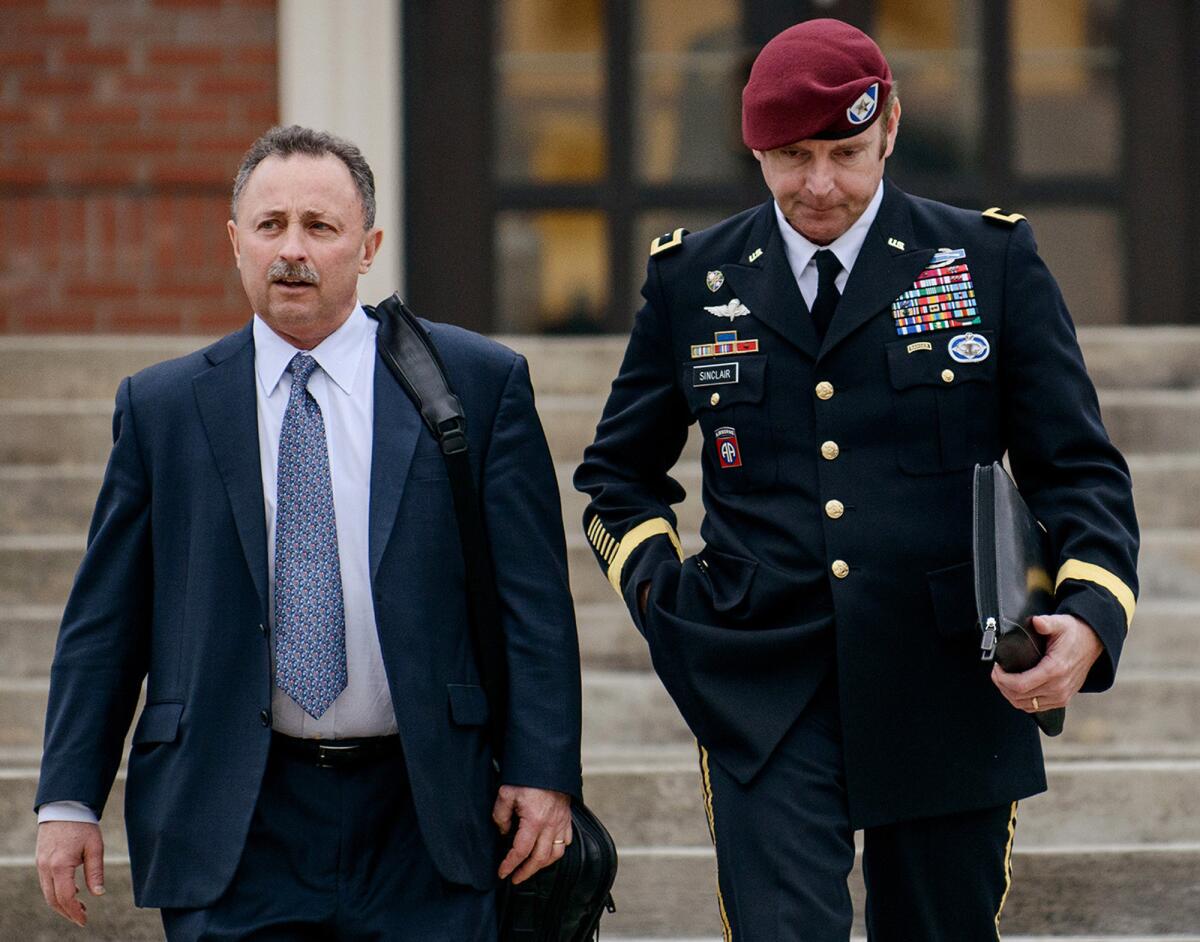General’s sex charge trial halted as plea negotiations ensue

FT. BRAGG, N.C. -- The sexual assault case against Army Brig. Gen. Jeffrey Sinclair was suspended indefinitely Tuesday as the general’s lawyers began negotiating a possible plea deal with Army prosecutors.
The abrupt halt came after a military judge, in an extraordinary ruling, declared Monday that he found evidence of improper political interference by the Army in the highly publicized case. He gave Sinclair’s lawyers an opportunity to seek a plea agreement even though testimony in the case began last week.
The judge, Army Col. James L. Pohl, told a jury panel of five male two-star generals Tuesday that he did not know how long the court-martial might be suspended. Sinclair’s lead attorney, Richard L. Scheff, said he expected the delay to last several weeks as the two sides negotiate.
If a plea agreement is reached, a new military commander with no previous ties to the case would decide whether to approve the deal. Under military law, a senior commander -- called a “convening authority” -- decides whether to bring sexual assault charges and approves plea deals.
On Monday, Pohl said there was evidence of “unlawful command influence” by the Army when it rejected Sinclair’s offer last year to plead guilty to adultery and other lesser charges in exchange for dropping sexual assault and other more serious counts. That plunged the case into turmoil.
“History was made,” Scheff told reporters after Tuesday’s brief hearing, in which panel members were sent back to their duty stations for an indefinite
Scheff has accused the Army of caving to intense political pressure and trumping up charges in order to show it is cracking down on sexual abuse. A surge of sexual assaults in the ranks has drawn acute political and public scrutiny.
It is extremely rare for pre-trial issues to be negotiated after a court-martial has already begun. But the finding of likely political interference, and the prosecution’s failure to turn over incriminating emails by Army officials until after the trial had begun, prompted the judge to halt proceedings. He rejected a defense motion to dismiss charges against Sinclair.
Pohl told the jury panel Tuesday of “twists and turns that are hard to anticipate.” He added: “Other issues have come up.”
A day earlier, the judge scolded prosecutors, telling them, “The only reason we are in this conundrum is because of the government’s late notice.”
Scheff said the defense team spent roughly 30 to 60 minutes in discussions with Army prosecutors late Monday, and held a brief meeting with them Tuesday. He said it was possible negotiations would resume Tuesday.
A 34-year-old Army captain testified Friday that Sinclair twice forced her to perform oral sex on him and threatened to kill her and her family if she disclosed their three-year sexual affair.
Sinclair faces life in prison if convicted on charges of sexual assault, sodomy, communicating a threat, groping the captain against her will, “open and notorious” sex, and abusing his government credit card in pursuit of trysts with the captain.
Sinclair, 51, the former deputy commander of U.S. troops in southern Afghanistan, pleaded guilty Thursday to adultery, inappropriate relationships with two other female officers; attempting an inappropriate relationship with a third; impeding an investigation and viewing pornography while on duty. That was a tactical move by the defense to avoid salacious accounts of philandering and pornography, and to focus instead on attacking the accuser’s credibility.
But the defense now has the option of withdrawing that plea as it attempts to negotiate a better deal. Scheff said the general will not budge from his assertion that he did not sexually assault or threaten anyone. He declined to say whether Sinclair will insist on no prison time and retirement at a reduced rank.
Sinclair, who is married with two children, faces up to 15 years in prison for the offenses to which he has pleaded guilty. If no plea deal is reached, the court-martial would resume with the same jury panel.
Asked whether he detected a softening in the Army’s position following the judge’s ruling, Scheff replied, “Yes.”
The judge ruled that emails turned over by prosecutors Saturday night showed that the three-star general serving as the convening authority in the case was likely influenced by political considerations. A special victim’s advocate sent a letter to Lt. Gen. Joseph Anderson that referred to possible political repercussions associated with accepting Sinclair’s plea, saying it risked “sending the wrong signal.”
Other emails revealed that senior military lawyers had doubts about the accuser’s credibility, and Anderson’s military legal adviser shared those concerns with the general.
Asked Tuesday whether the ruling was a victory for Sinclair, Scheff replied, “Absolutely one hundred percent, no question.’’
The lead Army prosecutor, Lt. Col. Robert Stelle, said he is prohibited from commenting under rules of professional responsibility.
Follow LATimes National on Facebook
ALSO:
D.C. mayor denies knowing about illegal campaign donations
Colorado marijuana sales rake in $2 million in taxes in January
Terror case prosecutors show video of accused praising 9/11 attacks
Twitter: @davidzucchino
More to Read
Sign up for Essential California
The most important California stories and recommendations in your inbox every morning.
You may occasionally receive promotional content from the Los Angeles Times.











